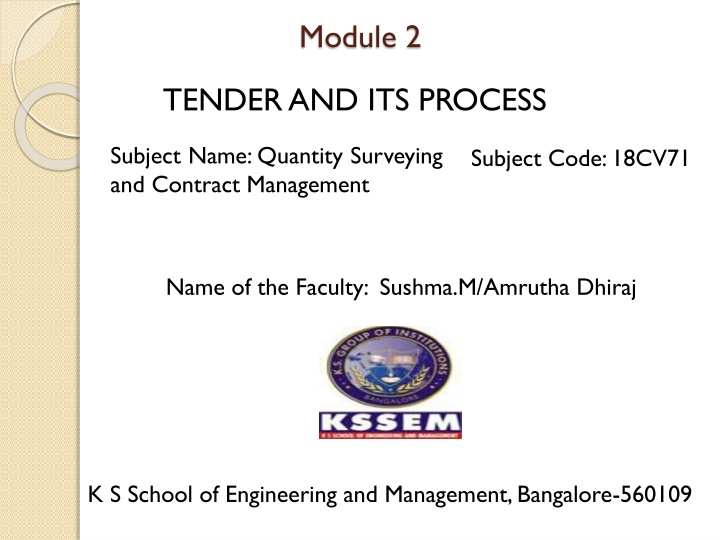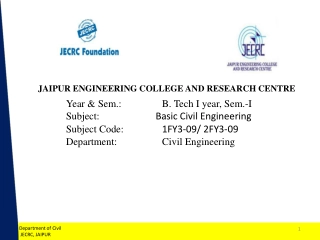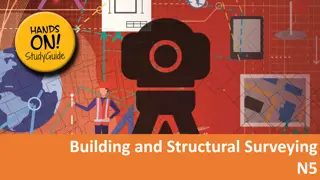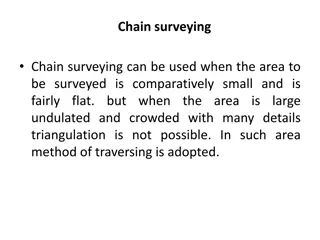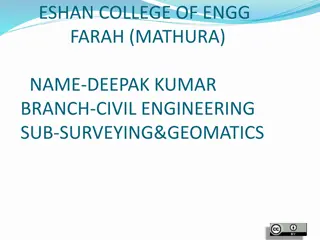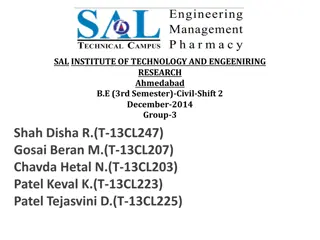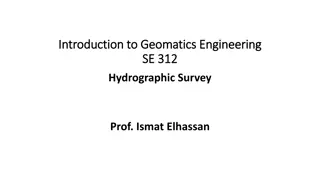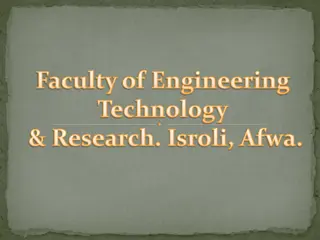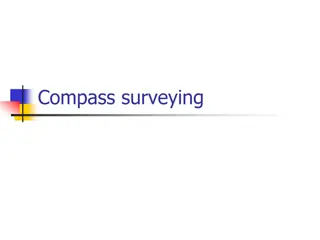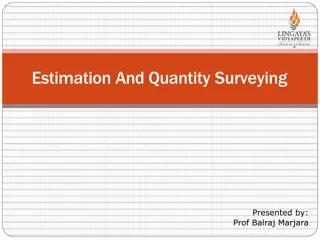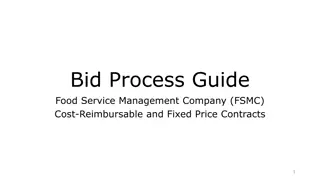Quantity Surveying and Contract Management in Civil Engineering
A comprehensive overview of tender processes, contract management, and the roles of owners, engineers, and contractors in civil engineering projects. Topics include standard tender documents, types of contracts, and laws governing contracts as per the Indian Contract Act of 1872. Explore the scope of civil engineering works, public vs. private projects, and the responsibilities of key stakeholders. Gain insights into the tendering process, bid evaluation, and contract formulation.
Download Presentation

Please find below an Image/Link to download the presentation.
The content on the website is provided AS IS for your information and personal use only. It may not be sold, licensed, or shared on other websites without obtaining consent from the author.If you encounter any issues during the download, it is possible that the publisher has removed the file from their server.
You are allowed to download the files provided on this website for personal or commercial use, subject to the condition that they are used lawfully. All files are the property of their respective owners.
The content on the website is provided AS IS for your information and personal use only. It may not be sold, licensed, or shared on other websites without obtaining consent from the author.
E N D
Presentation Transcript
Module 2 TENDER AND ITS PROCESS Subject Name: Quantity Surveying and Contract Management Subject Code: 18CV71 Name of the Faculty: Sushma.M/Amrutha Dhiraj K S School of Engineering and Management, Bangalore-560109
Module 2 Syllabus Contract Management -Tender and its Process: Invitation to tender Prequalification, administrative approval & Technical sanction Bid submission and Evaluation process Contract Formulation: Award of contract, letter of intent, letter of acceptance and notice to proceed Features / elements of standard Tender document (source: PWD / CPWD / International Competitive Bidding NHAI / NHEPC / NPC) Law of Contract as per Indian Contract act 1872 Types of Contract, Entire contract, Lump sum contract, Item rate, % rate, Cost plus with Target, Labour, EPC and BOT, Sub Contracting Contract Forms : FIDIC contract Forms , CPWD , NHAI , NTPC , NHEPC
Introduction A civil engineering may be called upon to design and carry out construction of large variety of works such as residential buildings, roads, bridges, railways, dams, docks, airports, power stations, water supply and drainage, tunnels, etc. Scope of civil engineer is therefore large.
Public works Private works Works constructed in the Works constructed for an interest of people at large. individual or group of individuals or a corporation or Ex. Highways, roadways, body that is or proposes to be dams, flyovers. in private business. Certain works for which funds are not immediately available with the Govt. or public body Cost of these works are met but which are capable of from private funds. giving returns immediately on completion and putting to use are constructed by BOT policy.
Owner, Engineer and Contractor Owner: individual, firm or public body which initiates and finances the work. Owner-Employer who employs Engineer and Contractor. Engineer (PMC): Civil engineer or a firm of consulting Engineers employed by the owner in order to advise him, negotiate for him and protect his interests. Engineer-Design and supervision of civil engineering works.
Owner, Engineer and Contractor Contractor: independent business men who take the responsibility of organization and execution of work. Contractor enters into suitable agreement with the owner.
Contract An agreement, the terms of which are enforceable by law is called a Contract . Agreement between owner and engineer and/or owner and contractor and/or contractor and sub contractor.
Development of a Project - Stages Owner employs engineer to investigate and plan the project. Engineering carries out preliminary investigations, prepares approximate estimate of cost and determines financial feasibility of the project. Engineer recommends project as technically and financially feasible and owner gives his consent to go ahead. Engineer undertakes detailed investigation and makes all the documents containing data ready to enable contractors to bid on the job (contract documents).
In case the owner is government, the detailed plans and estimates have to be checked and approved by a competent authority. When all is set for the construction of the project, contractors are invited to bid for the job. The contractors after making all the business arrangements, submit their offers known as tenders . The Engineer scrutinizes the proposals and selects a particular tenderer who enters into an agreement (the contract ) with the owner.
The contractor sets his organization into motion to carry out project in an efficient and economic way All parties to the contract must have knowledge of the law of contracts and the conduct of business Knowledge in latest developments in methods of contract management and organization and procedure adopted by Govt. departments in execution of a project is also essential
Tender Tender is an offer in writing to execute some specified work or to supply the materials at certain rates, within a fixed time under the certain conditions of agreements between the contractor and department or owner of any party. The construction work is usually done by contract. Sealed tenders are invited and the work is usually awarded to the lowest tender. While inviting tenders, the bill of quantities (BOQ), specifications, conditions of contract, plans and drawings are supplied to the contractors who quote their rates.
Purpose/Necessity of tender: Entrusting work by calling tender is necessary for the below reasons, To select a suitable contractor at a time appropriate to the situation of the project. To obtain an acceptable tender or offer upon which a contract can be let. To ensure the completion of project at scheduled time. To protect the interest of all stakeholders.
Invitation to Tender What is a Tender Process? A Tender Process (or "Invitation to Tender" process) is a method by which suppliers are selected for the provision of products and services to an organization The process involves creating a suite of Tender Documents to manage the supplier selection process The Tender Documents help the organization to select the best possible supplier available, and include documents such as the "Statement of Work", "Request for Information" and "Request for Proposal
Invitation to Tender When do I use a Tender Process? If you want to appoint an external supplier, then you need to document a formal Invitation to Tender Process By using a formal tender process, you can show that the preferred supplier was selected fairly This Tender Process includes all of the steps needed to select and contract external suppliers, quickly and efficiently
Tender notice Tender for construction work or supply of materials, labour, equipment and machinery are invited by issuing notice in a prescribed format called tender notice. After the tender documents have been prepared and approved by the authority, a notice inviting tenders has to be published on the notice board of all unit offices of the department. Tenders must be invited in the most open and public manner possible, by advertisement in the press and by notice in the English/ Hindi and the written language of the district, posted in public places.
Information in Tender notice The following particulars are written in the tender notice. 1. Mode of submitting the tender 2. Form in which tender has to be submitted 3. Name of the authority inviting the tender 4. Nature of the work and its location 5. Estimated cost of the work 6. Time Limit or period of completion 7. Availability of data and forms 8. Earnest money required along with the tender 9. Security deposit to be paid by the selected contractor
Information in Tender notice 10. Cost of tender documents 11. The last date, place and time of receipt of sealed bids 12. The date, time and place of opening of tenders 13. Award of contract 14. Whom to contact for further information
Useful Websites/ References https://eprocure.gov.in/ https://www.designingbuildings.co.uk/ https://civiconcepts.com
